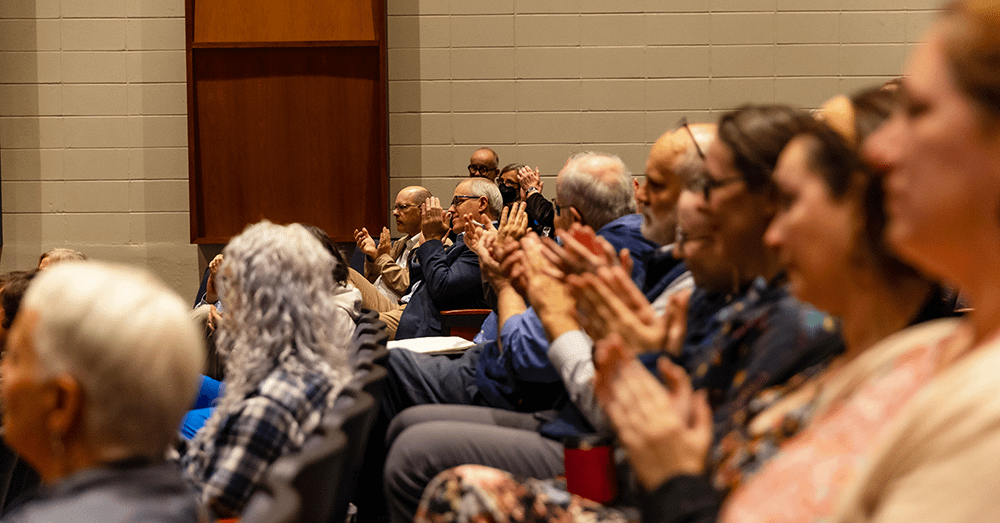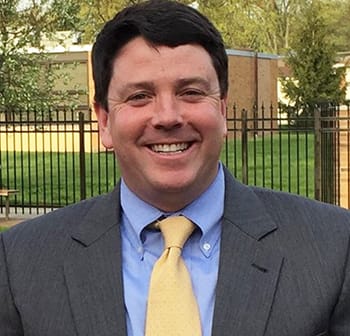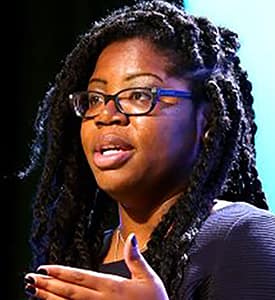Faculty keep up with ‘changing knowledge economy’
“Everyone here is leveraging technology to teach and deliver,” said Tom Van Dzura, a Saint Michael’s accounting instructor who joined a faculty development session in the Learning Resource Center of St. Edmund’s Hall on the morning of Wednesday, January 11.
He and about 15 colleagues across disciplines – all gearing to teach Saint Michael’s Accelerated Summer College’s hybrid courses, from Personal Financial Planning to the History of Rock ‘n’ Roll, during the upcoming fourth summer of the increasingly popular ASC, were sharing tips on how to make the most of the hybrid model, which blends online interaction and classroom time to deliver a full course at an accelerated pace. Veteran instructors like Van Dzura were helping first-timers get up to speed.
Leading the sessions were Kellie Campbell, Information Technology associate director and Accelerated Summer College director, and her crew – Anne Crowley and Jim Millard, instructional technologists/designers. “This is a day to invest in our faculty, empowering them to try new things in their teaching and delivery – understanding how to implement new pedagogies, and blend that with what we do so well at Saint Michael’s,” said Campbell. “The future of education is shifting, and we have respond and understand what that means for us and in the changing knowledge economy we live in”
The first session on January 10 was about designing a five-week online course “while asking ‘how do I continue to create community in this course and build off what works best at Saint Michael’s – which is community,’” Campbell said. She explained that this year’s sessions expanded from last year’s more limited trainings to include platforms and technologies that will support not only summer courses, but also longer-term courses during regular semesters. “I think people are starting to connect the dots,” she said. Several faculty participants said they hope to incorporate the new platforms into their traditional semester courses.
Among other reasons, ASC was designed to support just such academic innovation, Campbell said. “Technology is constantly changing – for students today, it is part of them – it’s part of what they have always known. Understanding how to blend new with what has been for so long is a challenge, but we are trying to emphasize it as an opportunity, and invest in it. In platforms used in ASC, content is available through both adaptive technologies and analytics – faculty are building on that, adding value, to deliver a personalized and accelerated experience for our students.”
For the recent training sessions, Campbell’s team created a framework/rubric for faculty to use in optimizing the new delivery models based on earlier experiences. On Wednesday she introduced ideas from the front of the class using visuals and conversations/questions before having pairs or groups collaborate on tasks at their computers. Each of the full-day sessions started at 9 a.m. and ran until 3 p.m. Some faculty attended both if they planned on teaching both hybrid and online-only courses.
Among faculty in Wednesday’s hybrid-course session were individual or multiple members of psychology, history, political science, fine arts/music, economics, classics, business, philosophy, biology, fine arts/art and mathematics departments. A handful of adjuncts joined regular faculty, since both were invited to participate through department chairs, Campbell said.
“One thing I’ve emphasized to them is that teaching in the summer gives them an opportunity to completely try something new with a fresh slate,” Campbell said, noting such experimenting is hard to do during the regular year. “I encourage everybody to dream big and do something new — supported by us … and each year will get a bit better. That opportunity to experiment is crucial.”
Van Dzura said he also was part of the Tuesday session focused mostly on online courses — which for him and most Saint Michael’s instructors is a largely untapped course model – one that in addition to the second ASC session, will drive an innovative new Winter 2017 program called “SMC First Class,” designed for high school seniors accepted to Saint Michel’s through early action programs.
Early response to the innovation appears promising. “This is an opportunity for them to take a real college course at Saint Michael’s and be introduced to the community, and I’m really excited to work beyond just the textbooks and traditional lectures,” says Van Dzura.
“The 10-week SMC First Class program is predominantly online, with the exception of one face-to-face meeting on Feb. 19 — a Sunday,” he said. “But all the course interaction and learning will be over a 10-week period, all online.” The course Van Dzura will teach is is Personal Financial Planning, which, he is finding, “is very appealing not just to students, but their parents.” He said he was particularly excited “about videos and multimedia and the online component in particular.”
Those aspects of hybrid and online course have similar appeal to William Ellis, who during the training session was analyzing the best way to use new tools in his “History of Rock” course, based on what had worked for him during past ASC sessions in a similar “History of Gospel” course.
“It’s more immersive in the content using the hybrid model, and when I taught my Gospel hybrid for ASC last year I found it’s almost the perfect balance between delivering content and getting students to assess and internalize the content,” he said. As in the Gospel course, he will create Spotify modules for students to hear the music before coming to class. “If the student are doing their job, we have a lot more to discuss and analyze and pull apart when we do get together,” Ellis said.
Robert Letovsky of business helped Wednesday’s group talk through some work-arounds for those predictable times when students may not meet all the course expectations in a timely way, so instructors are able to keep things moving efficiently for all students while helping the slow workers catch up.
Ari Kirschenbaum of psychology, entering his third summer teaching in ASC, said of his colleagues: “A lot of us love teaching, so it’s just another opportunity to teach, but in a different way. You get some students with different perspectives during the summer from different institutions, and that’s all very exciting.” But the accelerated aspect of the courses poses challenges, he feels, since sleep is so important to memory, as he knows from his professional research — “and taking 16 weeks of material and crunching it down to six, students don’t have the time they need to consolidate information.” This is why he thinks, “for me, the hybrid really works for ASC in ways that can’t work in a regular semester — but I wouldn’t want to use it for longer courses, since I feel we would be sacrificing something valuable from the traditional model.”
Karen Popovich of the business faculty, also entering her third ASC summer, spoke of ‘adding new tools to my teaching bag of tricks and being able to look at multimodal, multi-mode technology in online formats, from video to audio, and really being able to engage students on their academic journeys.” Popovich also had taken the previous day’s training session about online courses since she’ll be doing both upcoming summer sessions: The first is hybrid and six weeks, while the second is five weeks and online-only for the first time, she explained.
“This campus will be buzzing this summer,” she said.
For Campbell, it’s about “supporting an environment of innovation – it takes it from transactional change to transformational change, and that’s what we need right now.” By now she has seen more than 40 faculty teach in ASC, “and many have been re-inspired, understanding that this isn’t taking away, but building on what works. We are constantly assessing and improving, thanks to the experience and assessment of our faculty and students,” she said.
“That timely change is important for continued growth,” said Campbell. “I am thankful for the support of our leadership and their investment and trust – I can tell you that many of my colleagues at other institutions are, for lack of a better term, jealous — this is a true investment in our future.





